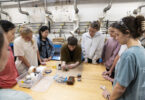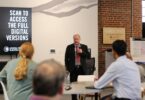Athens, Ga. – Historical news footage made available through the University of Georgia Libraries provide the basis for a documentary to air Sunday as part of the syndicated series “Andrew Young Presents.”
“How We Got Over” will air on WSB-TV Sunday at 1 p.m.The documentary focuses on news coverage of the Civil Rights Movement as it happened.
“It’s an eye-opening experience that will surprise young viewers who may not fully know what came before the ‘Obama’ generation,” said producer CB Hackworth.
Andrew Young, a veteran of the Civil Rights Movement, former mayor of Atlanta, member of Congress and U.N. ambassador, uses the footage to bring the movement to life. Among the clips is a 1971 interview with Young in which he predicts the election of a black president.
The raw news footage, from WSB in Atlanta and WALB in Albany, form the centerpiece of the Civil Rights Digital Library.
“The Civil Rights Digital Library (CRDL) initiative is the most ambitious and comprehensive effort to date to deliver educational content on the Civil Rights Movement via the Web,” said P. Toby Graham, director of the Digital Library of Georgia, based at the UGA Libraries. “It is national in scope and there really is nothing else like it.”
Held by the Libraries’ Walter J. Brown Media Archives and Peabody Awards Collection, the moving images-about 450 clips–cover a broad range of key civil rights events.
“The video archive covers both national figures and local leaders,” according to Ruta Abolins, director of the Brown archives. “There is more than two hours of film related to Martin Luther King, Jr. Dr. King’s role in the Albany Movement is documented extensively, including clips of speeches at mass meetings, his arrest by local police, press conferences, and his visit to a pool hall to urge local African Americans to adopt non-violence in achieving change in Albany.”
In addition to the news film, the digital library includes related holdings from 75 libraries, archives, and museums across the nation. Most of the more than 100 collections are original documentation of the period, such as oral histories, letters, diaries, FBI files, and photographs.
“The news footage itself is riveting,” Graham said. “For those too young to remember the Movement, it’s as close as we’ll get to being eyewitnesses to these events.”
“The UGA Libraries are especially proud of this project, which not only makes history comes alive but makes it accessible to anyone,” said William Gray Potter, the university librarian and associate provost. “We are especially gratified by the interest that Ambassador Young has taken in this endeavor and were honored to share it with him.”
A full-length version of the documentary is planned for public viewing and to be available on DVD.
More information can be found at http://www.andrewyoung.org/ and http://www.civilrightslibrary.org/.







